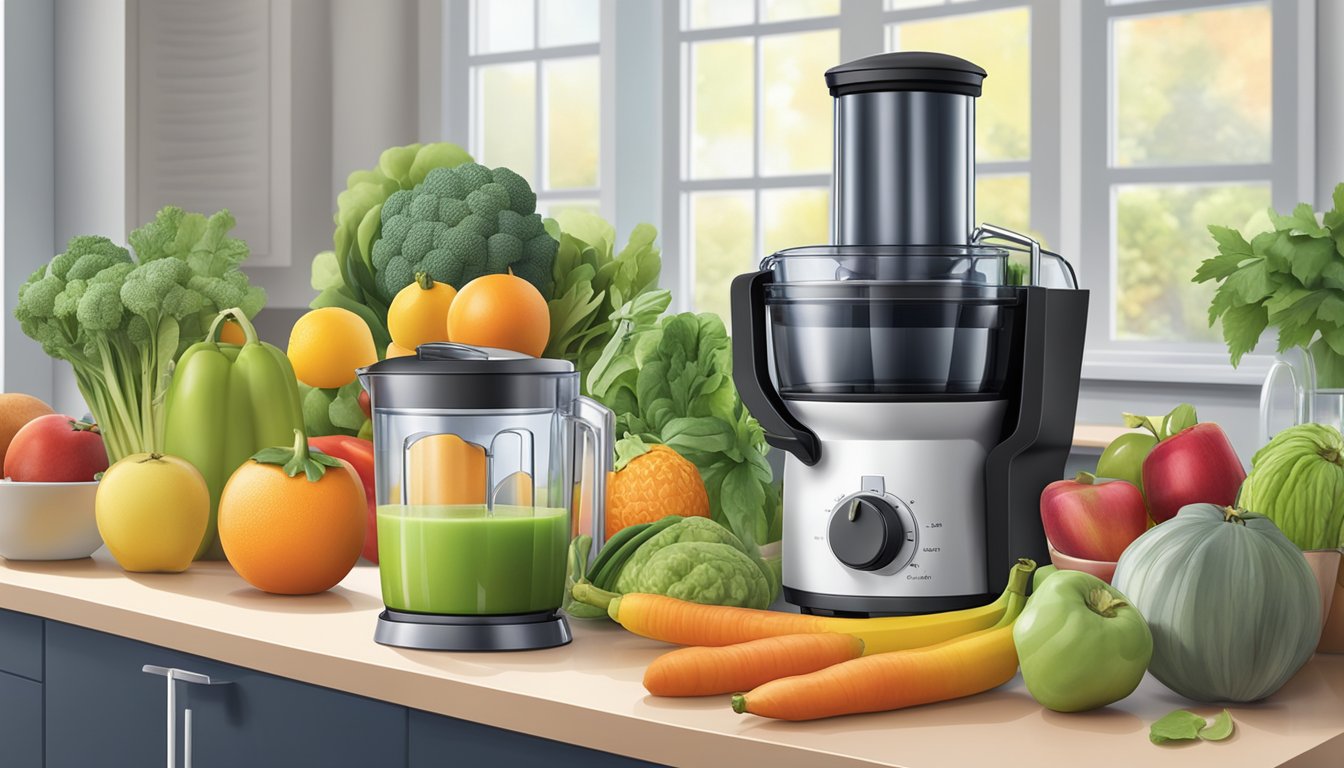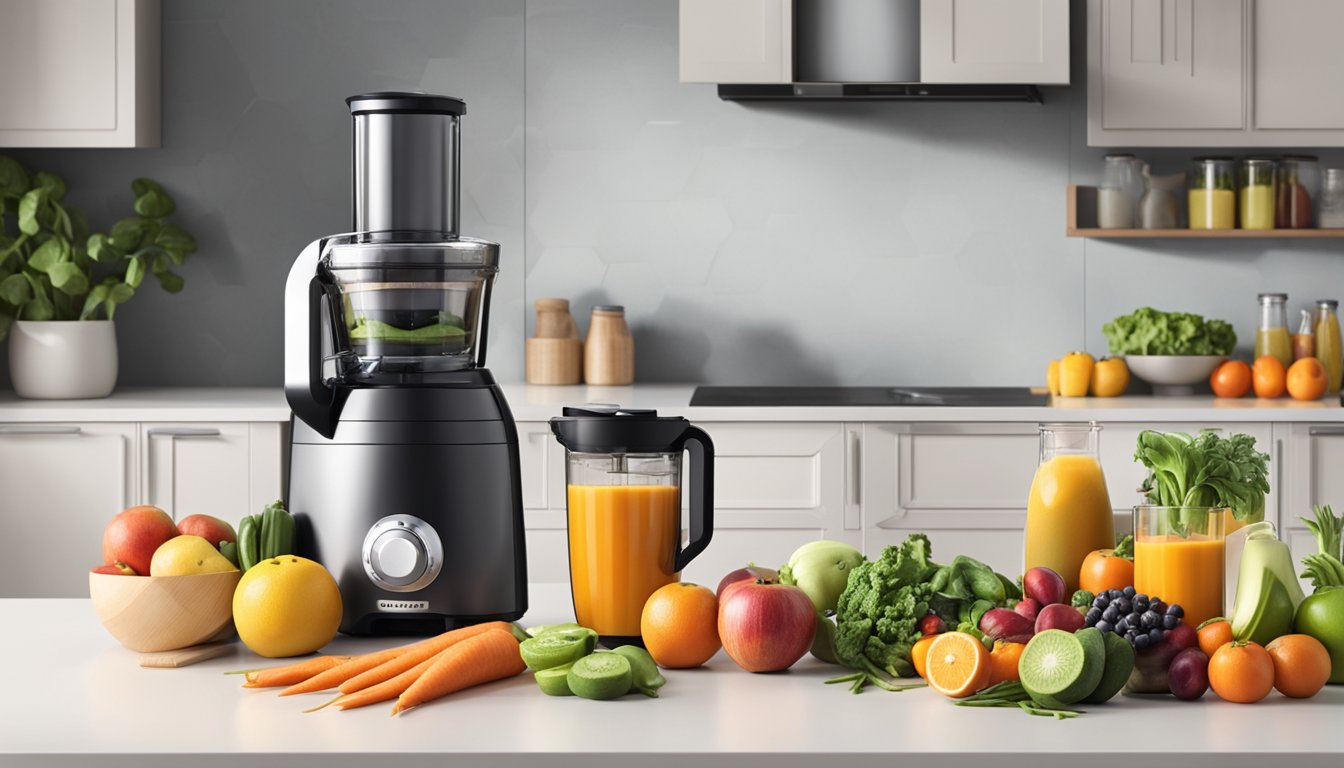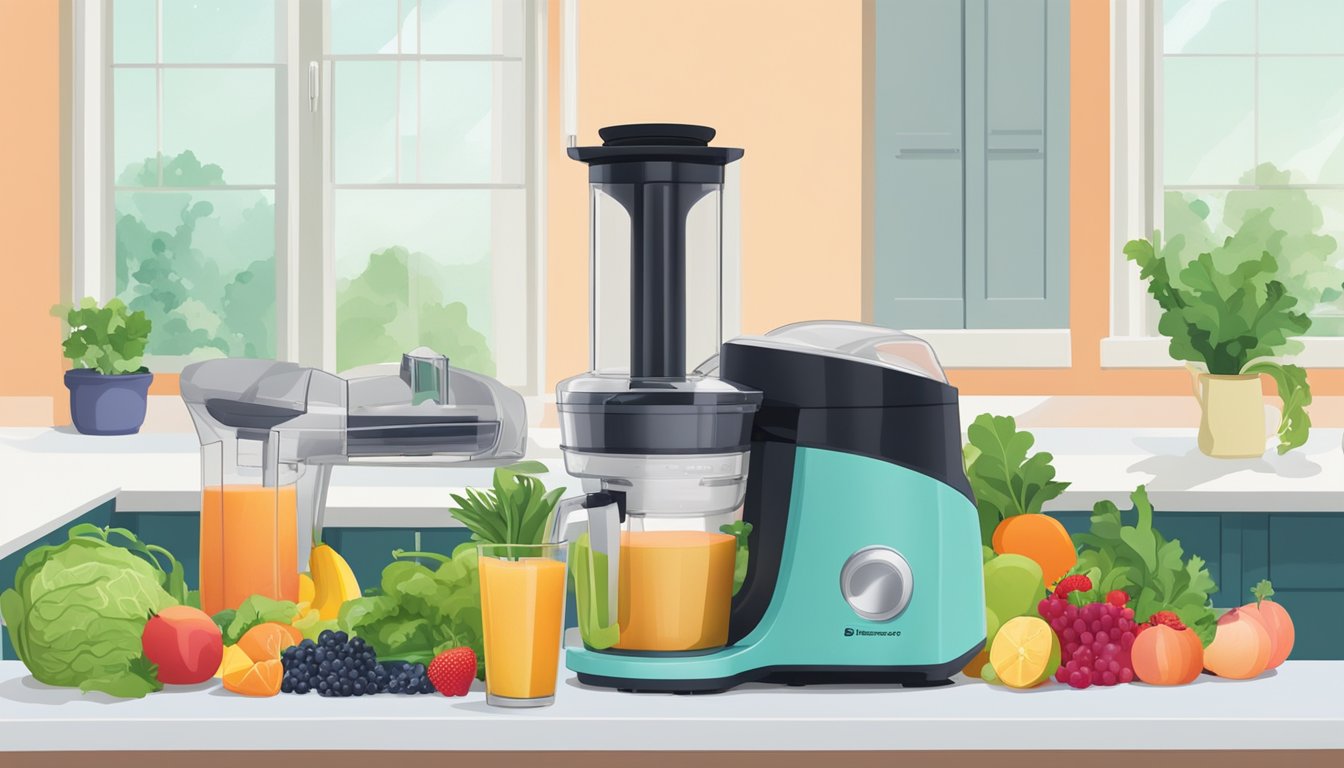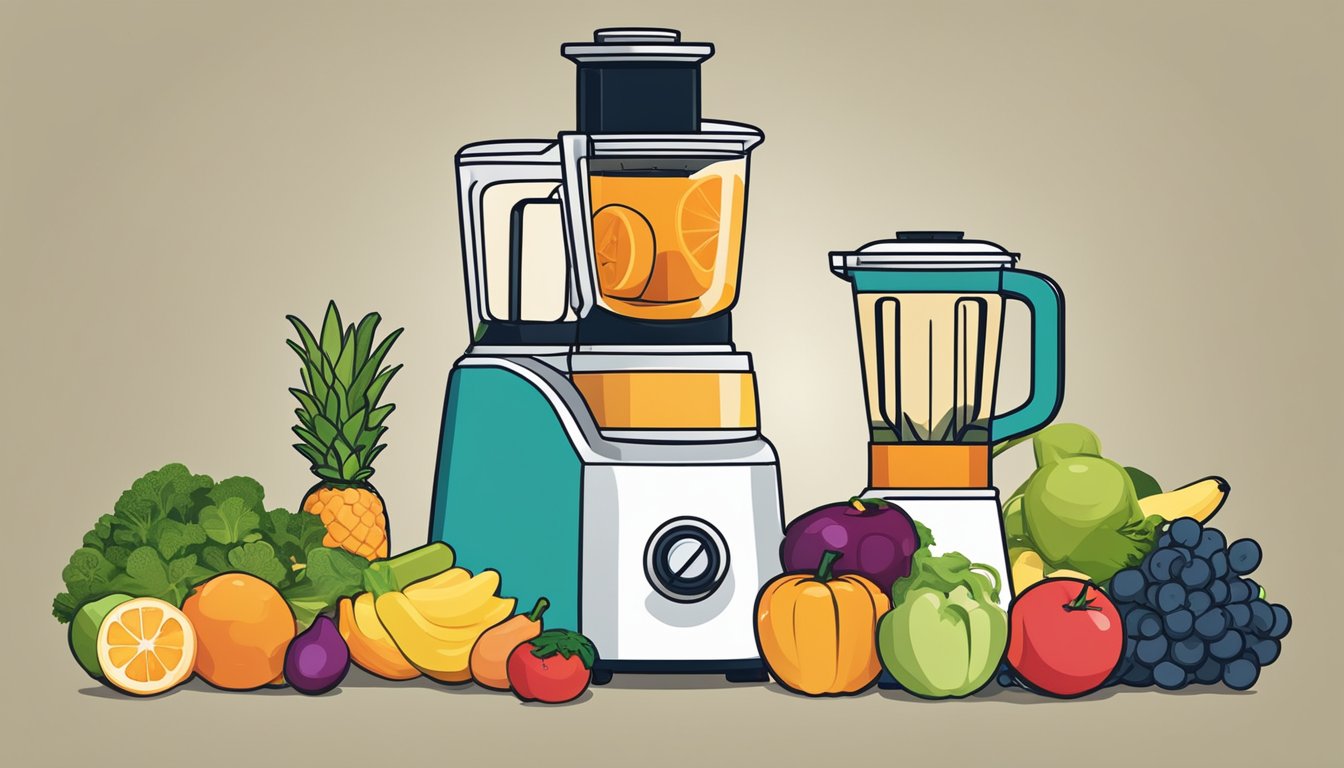Are you struggling to choose between a juicer and blender? Both appliances are great for making healthy drinks, but they have different functions. Juicers extract juice from fruits and vegetables, while blenders blend the whole fruit or vegetable, including the pulp and fibre.

If you're looking to increase your daily intake of vitamins and minerals, both juicers and blenders can help. However, the nutritional value of the drinks you make will depend on the ingredients you use and the method of preparation. Juicers extract the juice from fruits and vegetables, leaving behind the pulp and fibre. This means that you get a concentrated dose of vitamins and minerals, but you miss out on the fibre. Blenders, on the other hand, blend the whole fruit or vegetable, including the pulp and fibre. This means that you get all the nutrients, including the fibre, in a single drink.
So, which one should you choose? The answer depends on your personal preferences and health goals. In this article, we'll take a closer look at the differences between juicers and blenders, the health benefits of each, and how to choose the right appliance for your needs.
Key Takeaways
- Juicers extract juice from fruits and vegetables, while blenders blend the whole fruit or vegetable, including the pulp and fibre.
- Juicers provide a concentrated dose of vitamins and minerals, but miss out on the fibre, while blenders provide all the nutrients, including the fibre, in a single drink.
- The choice between a juicer and blender depends on your personal preferences and health goals.
Understanding Juicers and Blenders

Types of Juicers
Juicers come in three main types: centrifugal, masticating, and cold press. Centrifugal juicers are the most common type and are great for those who want a quick and easy juicing experience. Masticating juicers are slower but produce more juice and retain more nutrients. Cold press juicers are the slowest but produce the highest quality juice with the most nutrients.
Types of Blenders
There are several types of blenders available, including countertop blenders, immersion blenders, and portable blenders. Countertop blenders are the most common and come in various sizes and power levels. Immersion blenders are handheld and great for blending soups and sauces. Portable blenders are perfect for those who want to make smoothies on-the-go.
Key Differences
The key difference between juicers and blenders is the way they process fruits and vegetables. Juicers extract the juice from the produce, leaving behind the pulp and fibre. Blenders, on the other hand, blend the entire fruit or vegetable, including the fibre.
Pros and Cons
Juicers are great for those who want to consume a large amount of nutrients in a short amount of time. However, they can be expensive and produce a lot of waste. Blenders are great for those who want to consume the entire fruit or vegetable, including the fibre. However, they can be more difficult to clean and produce a thicker texture.
Health and Nutrition
Both juicers and blenders can be great for your health. Juicing can provide a quick and easy way to consume a large amount of nutrients. Blending can help you consume the entire fruit or vegetable, including the fibre, which can help with digestion and gut health.
Usage and Versatility
Juicers are great for making juice, while blenders are great for making smoothies, sauces, and soups. Blenders can also be used to grind nuts and seeds. Both juicers and blenders can be versatile in their usage, depending on the model and attachments.
Waste and Efficiency
Juicers can produce a lot of waste, as they extract the juice and leave behind the pulp and fibre. Blenders produce less waste, as they blend the entire fruit or vegetable. However, blenders can be less efficient at extracting nutrients.
Consumer Considerations
When choosing between a juicer and blender, consider your personal preferences, budget, and nutritional goals. Look for models that are easy to clean and use, and consider the cost of replacement parts.
Environmental Impact
Both juicers and blenders can have an environmental impact, as they require energy to operate and can produce waste. Look for models that are energy-efficient and consider composting the waste produced.
Aesthetic and Design
Juicers and blenders come in various designs and colours, so you can choose one that fits your aesthetic preferences. Consider the size and storage options when choosing a model.
Maintenance and Durability
Both juicers and blenders require regular cleaning and maintenance to ensure they operate properly. Look for models that are easy to clean and come with a warranty.
Cost Comparison
Juicers and blenders can vary in price, depending on the model and features. Consider your budget and nutritional goals when choosing a model.
In summary, both juicers and blenders have their pros and cons. Consider your personal preferences, budget, and nutritional goals when choosing between the two. With the right model, you can enjoy delicious and nutritious food and drinks that are easy to make and good for your health.
The Ultimate Guide to Choosing Between a Juicer and Blender

Are you looking to improve your health and wellness by incorporating more fruits and vegetables into your diet? Do you want to make delicious and nutritious drinks at home? Choosing between a juicer and blender can be a daunting task, but fear not! This guide will help you make the right choice based on your lifestyle, dietary goals, taste and texture preferences, ease of use and cleaning, investment and value for money, and practical considerations for kitchen space.
Lifestyle and Dietary Goals
Your lifestyle and dietary goals are important factors to consider when choosing between a juicer and blender. If you're looking to lose weight, a juicer may be the better choice as it extracts the juice from fruits and vegetables, leaving behind the pulp and fibre. This means you can consume more nutrients and fewer calories. On the other hand, if you're looking for a thicker consistency and more fibre, a blender may be the better choice.
Taste and Texture Preferences
If you prefer a smooth and pulpy texture, a blender may be the better choice. Blenders can blend fruits and vegetables into smoothies, which retain the fibre and pulp. Juicers, on the other hand, extract the juice from fruits and vegetables, leaving behind the pulp. If you prefer a thinner and smoother consistency, a juicer may be the better choice.
Ease of Use and Cleaning
When it comes to ease of use and cleaning, blenders are generally easier to clean than juicers. Most blenders can be washed in a dishwasher, while juicers require more time and effort to clean. However, some juicers are designed with easy-to-clean features, such as removable parts that can be washed in a dishwasher.
Investment and Value for Money
Juicers and blenders come in a range of prices, from budget-friendly options to high-end models. If you're on a tight budget, a blender may be the better choice as they tend to be less expensive than juicers. However, if you're looking for a long-term investment and value for money, a juicer may be the better choice as they can extract more juice from fruits and vegetables, resulting in less waste.
Impact on Health and Wellness
Both juicers and blenders have health benefits, but they differ in the way they process fruits and vegetables. Juicers extract the juice from fruits and vegetables, which can be beneficial for digestion, gut health, and blood sugar control. Blenders retain the pulp and fibre, which can be beneficial for digestion, gut health, and weight loss.
Practical Considerations for Kitchen Space
When choosing between a juicer and blender, it's important to consider your kitchen space. Juicers tend to be larger and take up more counter space than blenders. If you have limited counter space, a blender may be the better choice.
The Verdict: Making the Right Choice
In conclusion, the choice between a juicer and blender ultimately depends on your lifestyle, dietary goals, taste and texture preferences, ease of use and cleaning, investment and value for money, and practical considerations for kitchen space. Both juicers and blenders have their advantages and disadvantages, so it's important to weigh your options carefully before making a decision.
If you're looking for high-quality juicers and blenders, check out Megafurniture.sg, a leading Singapore ecommerce furniture store. We offer a wide range of juicers and blenders at competitive prices, so you can find the perfect one for your needs.
Frequently Asked Questions

Which provides more nutritional benefits, juicing or blending?
Both juicing and blending have their own unique nutritional benefits. Juicing extracts the liquid from fruits and vegetables, leaving behind the pulp. This results in a concentrated dose of vitamins, minerals, and antioxidants. Blending, on the other hand, retains the fiber and other nutrients found in the whole fruit or vegetable. This makes it a great option for those looking to increase their fiber intake.
What are the health implications of choosing a blender over a juicer?
Choosing a blender over a juicer can have a number of health benefits. Blending allows you to retain the fiber and other nutrients found in the whole fruit or vegetable. This can help regulate blood sugar levels, improve digestion, and reduce the risk of heart disease.
Could you shed light on the weight loss advantages of juicers compared to blenders?
Juicing can be a great way to kickstart a weight loss program. By extracting the liquid from fruits and vegetables, you can consume a large amount of nutrients without consuming a large amount of calories. However, it's important to note that juicing should not be used as a long-term weight loss solution. Blending can also be beneficial for weight loss, as it allows you to consume a large amount of fiber, which can help you feel full and satisfied.
What are the key differences between a juicer, blender, and a food processor?
A juicer is designed to extract the liquid from fruits and vegetables, leaving behind the pulp. A blender is designed to blend fruits and vegetables into a smoothie or other drink. A food processor is designed to chop, grate, and puree foods. Each of these appliances has its own unique uses and benefits.
Are there any notable drawbacks to using a juicer for daily nutrition?
While juicing can be a great way to consume a large amount of nutrients, there are some notable drawbacks to using a juicer for daily nutrition. Juicing can be expensive, as you need a large amount of fruits and vegetables to produce a small amount of juice. Additionally, juicing can be time-consuming, as you need to clean the juicer after each use.
Does cold-pressed juice offer superior health benefits compared to blended juice?
Cold-pressed juice is often touted as being superior to blended juice, as it is made using a high-pressure process that extracts the maximum amount of nutrients from the fruits and vegetables. However, there is little scientific evidence to support these claims. Both cold-pressed juice and blended juice can be a great way to consume a large amount of nutrients in a single serving.








